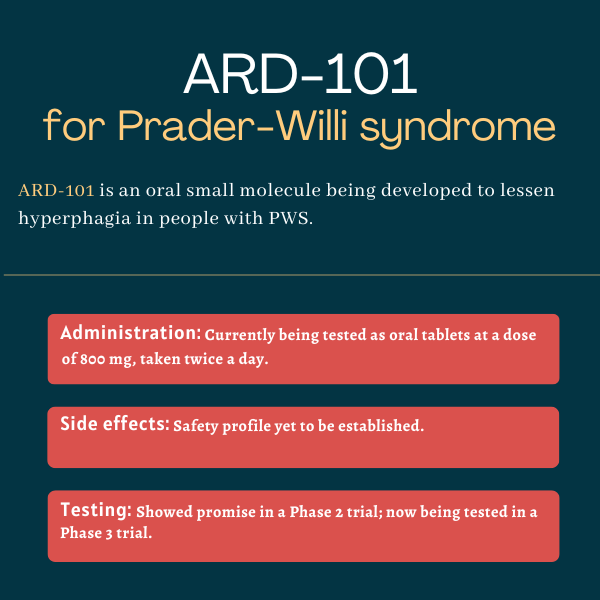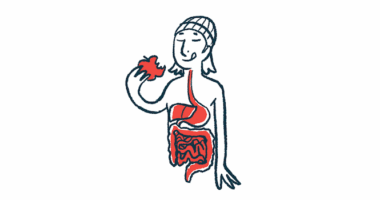
ARD-101 for Prader-Willi syndrome
Last updated Oct. 14, 2025, by Margarida Maia, PhD

ARD-101 is an oral candidate Aardvark Therapeutics is developing to treat hyperphagia, or an insatiable, uncontrollable hunger, in people with Prader-Willi syndrome (PWS).
A hallmark PWS symptom, hyperphagia typically starts during early to mid childhood. It leads to excess weight and obesity, which are associated with several health risks. Hyperphagia is also associated with challenging behaviors among patients, including anger related to food-seeking and frustration when food is inaccessible.
People with PWS are thought to have abnormal regulation or responses of hunger-blocking hormones, including cholecystokinin (CCK), that may contribute to hyperphagia.
ARD-101 is an oral small molecule designed to activate bitter taste receptor proteins in the gut. This triggers the release of two gut hormones, CCK and glucagon-like peptide-1 (GLP-1), that communicate with the brain to control hunger and food intake.
The experimental therapy has been shown to act largely within the gut, with minimal bodywide exposure. As such, ARD-101 is expected to help control hyperphagia and related behaviors with minimal side effects.
In the U.S., ARD-101 has received orphan drug and rare pediatric disease designations for the treatment of PWS. These designations provide benefits that may help accelerate a treatment’s development and regulatory review; orphan drug status also provides for a period of market exclusivity should the therapy ultimately be approved.
Therapy snapshot
| Treatment name: | ARD-101 |
| Administration: | Being tested as oral tablets |
| Clinical testing: | Now in a Phase 3 clinical trial |
How will ARD-101 be administered?
ARD-101 is available as oral tablets. In an ongoing Phase 3 clinical trial, the therapy is administered through a stepped dosing regimen that starts at 200 mg twice a day and increases to 800 mg twice daily.

ARD-101 in clinical trials
After a Phase 1 clinical trial showed that ARD-101 was safe and well tolerated in healthy adults, the investigational treatment was tested in a Phase 2 study (NCT05153434). That trial enrolled 19 people with PWS, ages 17-65, at two U.S. sites.
A total of 13 patients received ARD-101 at a fixed dose of 200 mg twice daily for 28 days, or about one month. The other six patients gradually increased their dose, from 400 mg twice daily to 800 mg twice daily, over a one-month period. The results showed that treatment was associated with:
- a reduction in hyperphagia, as reflected by an average drop of 8.5 points in the Hyperphagia Questionnaire for Clinical Trials (HQ-CT) score, a caregiver-reported assessment of hyperphagia-related behaviors
- a trend toward decreased body fat, by about 1.5%, and increased lean muscle, by more than 2%
A global Phase 3 trial dubbed HERO (NCT06828861) is now testing ARD-101, taken twice daily for about three months, against a placebo in an estimated 90 teenagers and adults with PWS. The trial involves participants ages 13 and older. But the company is planning to expand the trial’s eligibility to younger patients.
ARD-101 will be started at a dose of 200 mg twice daily, and then increased to the target dose of 800 mg twice daily for the majority of the treatment period. During the trial, participants are not allowed to use Vykat XR (diazoxide choline), the only approved therapy for PWS-related hyperphagia.
The study’s main goal is to watch for changes in HQ-CT scores after the three-month treatment period. Top-line data are expected in early 2026, and those completing HERO may choose to enter an open-label extension study in which all participants will receive ARD-101.
ARD-101 side effects
Full results of the ARD-101 Phase 2 trial have not been published to date, so the therapy’s side-effect profile in people with PWS remains unclear.
Nevertheless, available data suggest that reported adverse events have been mild and transient, resolving on their own. Also, unlike medications that mimic GLP-1, ARD-101 does not seem to be associated with noticeable nausea or diarrhea.
Prade-Willi Syndrome News is strictly a news and information website about the disease. It does not provide medical advice, diagnosis, or treatment. This content is not intended to be a substitute for professional medical advice, diagnosis, or treatment. Always seek the advice of your physician or other qualified health provider with any questions you may have regarding a medical condition. Never disregard professional medical advice or delay in seeking it because of something you have read on this website.
Recent Posts
- Adults with PWS need lifelong support in daily activities, study finds
- Celebrating a milestone in life with Prader-Willi syndrome
- New technique ‘wakes up’ silent genes in Prader-Willi in lab testing
- Probiotics may boost beneficial gut bacteria in Prader-Willi syndrome
- Avoiding meltdowns during the holidays with Prader-Willi syndrome
- PWS patients see weight loss, less hunger with setmelanotide in trial
- Eye-tracking test adapted to better measure hunger behaviors in PWS
- We struggled to find mental health support for our son with PWS
- How Prader-Willi families can enjoy the holiday season
- Diabetes medications may support kidney health in adults with PWS




